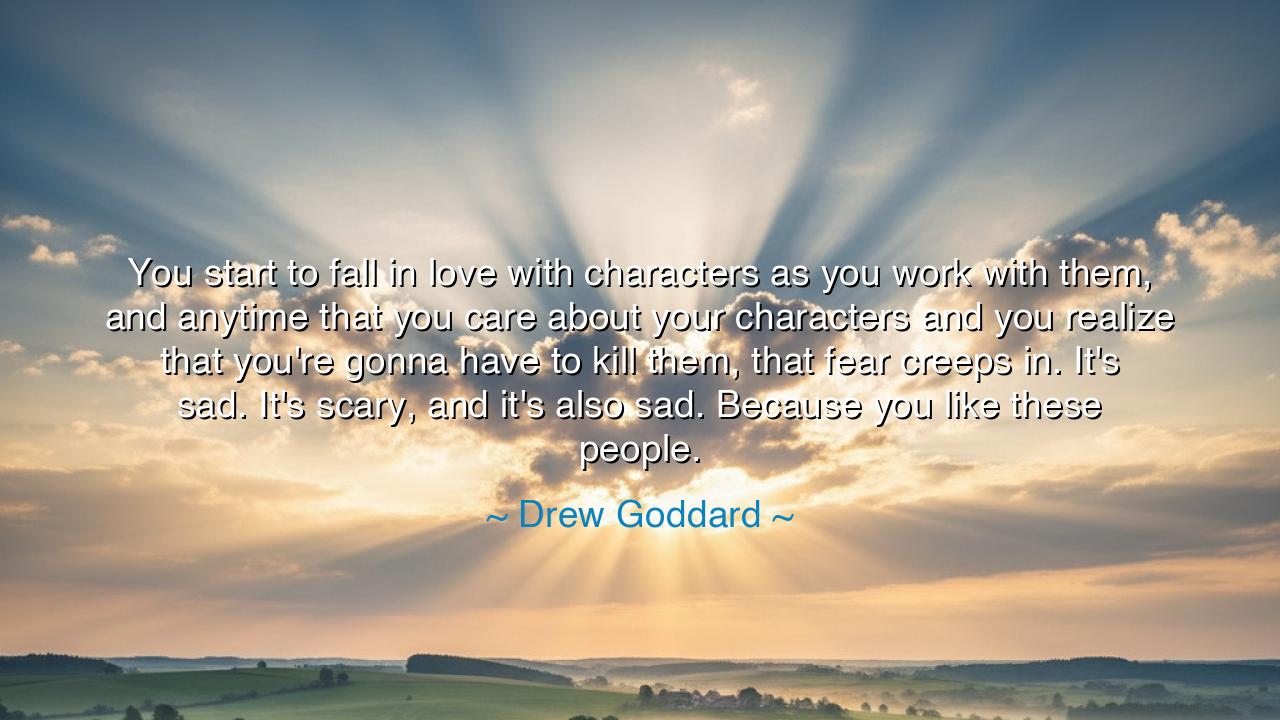
You start to fall in love with characters as you work with them
You start to fall in love with characters as you work with them, and anytime that you care about your characters and you realize that you're gonna have to kill them, that fear creeps in. It's sad. It's scary, and it's also sad. Because you like these people.






Drew Goddard, a weaver of stories and shaper of worlds, once confessed: “You start to fall in love with characters as you work with them, and anytime that you care about your characters and you realize that you're gonna have to kill them, that fear creeps in. It's sad. It's scary, and it's also sad. Because you like these people.” Though these words are spoken by a storyteller about his craft, they echo far beyond the page, touching on the ancient sorrow of creation itself: that to bring something to life is to one day face its loss.
The ancients understood this paradox deeply. In the Greek tragedies, playwrights like Sophocles and Euripides breathed life into kings and queens, only to drag them into ruin before the eyes of weeping audiences. The dramatist loved his characters, but he was bound to truth: that suffering and death are part of existence. To kill a character is not simply cruelty, but a reminder that in all stories—whether of fiction or flesh—mortality waits at the end. Goddard’s fear is not only of the act of writing death, but of the echo it carries from life itself.
For in the labor of creation, the artist becomes a parent, a guardian, a companion to the beings he invents. They begin as shadows, then take on form, then voice, until they feel as real as family. And when the tale demands their departure, the artist is torn: to fulfill the truth of the story means to wound oneself, for the loss of a beloved character is also the loss of a part of the creator’s own heart. This is why Goddard says it is sad—for the writer mourns as sincerely as the reader.
History, too, offers us parallels. Consider Charles Dickens, who wept when writing the death of Little Nell in The Old Curiosity Shop. The sorrow was so deep that Dickens himself fell ill, consumed by the grief of losing a child of his own imagination. Or recall Victor Hugo, who wrote of Fantine and Gavroche in Les Misérables with such tenderness that when they died upon the page, generations of readers felt as though their own friends had been torn away. Such is the strange power of art: the unreal becomes beloved, and the loss of the unreal feels all too real.
Yet this struggle reveals something noble: to feel grief at the loss of one’s own creations is proof of love. Goddard admits it is scary to take the life of a character, but this fear arises from compassion, from care, from treating these imagined beings not as tools but as people. And what is true for the writer is also true for the reader and the audience—when we grieve for a character, we grieve because they reflected something of ourselves, of our hopes, our struggles, our mortality.
The lesson for us all is that to create—to write, to paint, to love, to build—is to accept the inevitability of letting go. Children grow and leave, projects reach their end, even friendships sometimes pass. But the sorrow of their ending does not diminish their worth; indeed, it proves their worth. For what is not loved cannot be mourned, and what is mourned has surely been loved.
Therefore, take Goddard’s words as guidance: do not fear the sadness of endings. When the time comes to close a chapter—whether in a story, a season of life, or a relationship—allow yourself to grieve, but also to rejoice that you cared enough to feel the loss. Fear may creep in, but it is the shadow cast by love. Better to mourn what was truly cherished than to live untouched, never loving, never risking, never losing.
For in the end, the act of killing a character, of facing an ending, teaches us the deepest truth: every story, even life itself, is finite. But within that finitude lies the power to feel, to connect, to remember. And in those feelings, we discover what it means to be fully human.






AAdministratorAdministrator
Welcome, honored guests. Please leave a comment, we will respond soon